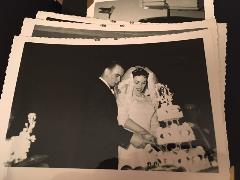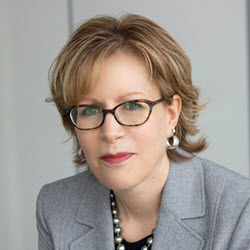Reflecting on a Life Lived
Apr 23, 2020
One of my favourite magazines is the long-standing Reader's Digest, because they share great stories about people and their lives. As financial planners and investment advisors, we focus on individuals and their families, but we can slip too easily into a world of jargon and technical details.
With the recent passing of my mother-in-law, Ruth, I reflected upon her life and how ours intersected with hers. Was she happy? How could we have made her more comfortable in life? Was there anything she had yet to say to us? Could we have been more attentive? Was she worried about anything? Were we listening to what mattered in her life?
Ruth slipped away quickly; one might even say, unexpectedly. She was 79, on borrowed time with her heart valves, and prone to kidney trouble. Reflecting upon her life was the source of my parting comments at her funeral. I had the blessing of knowing Ruth for more than 40 years – longer than my own mother.
Her passing marked the end of my husband’s and my last living parent. In the past, we made regular visits to see her, which drew additional family. I wondered if now we would make fewer visits to see those other family members or if we would need to make a more concerted effort to connect. Over the years, I have found that Facebook has been a great way to keep up with cousins and extended family – almost like a living Christmas card, edited for many.
Communication with parents as they aged evolved. In our case, our parents lived anywhere from four to twelve hours away. Ruth lived a province over and not near to either her daughter, son, or grandchildren. She wasn't inclined to move near any of them, despite being asked to do so by her children. No one to blame – it just was. I found that phone conversations increased with age. We spoke at least once a week. Hubby and I were determined to call when she popped into mind – often while in the car en route to appointments, or while puttering around doing chores at home. (I highly recommend a headset for your phone.) The conversations would catch us up on medical issues, how relatives on the farm were doing, what was new at the seniors’ centre, or maintenance work that needed to be done on our next visit.
Cards, pictures, and flowers seemed to always be a hit. We went through a few printers to find one that worked easily with our cellphones. Every couple of months, we’d print a few capturing the children and grandchildren, pop them in a catchy card, and mail them off. They were taped to the glass of the china cupboard, or put up on the fridge. They prompted conversation at the next call. Though Ruth was very comfortable with her own company, I wondered if we spent enough time with her, or talked often enough, or shared enough of the goings-on of our family with her. On rare occasions, she would confess to feeling a little lonely. Loneliness can be fatal for seniors. A 2012 UK study that tracked more than 6,500 elderly men and women over a seven-year period, reported that the lack of social contact leads to early death, regardless of the participants’ underlying health issues1. Isolation is one of the main risk factors that worsen pre-existing conditions.
One of her favourite activities was “going to work” once a week at the seniors’ centre. There, she either assisted members as they came into the centre or led a knitting class. She never saw herself as a volunteer. The interaction was good for her mental health (we joked, even in her final hours, how she still had her mental capacity). The interaction with the younger folks (paid staff) helped bridge the generation gap. When you’re born in the ’40s, you usually know a thing or two about how to manage without a computer.
Over the last few months, while cleaning out her home, we gleaned more insights into this woman. She kept copious medical details, writing and re-writing in notebooks, along with articles to help her recognize signs of potential issues. In life, she wasn’t one to over-medicate, and she regularly commented that she “was fine” or didn’t want to “be a bother.” Was she afraid that something was on the horizon? She only briefly hinted about that a month before she was gone.
She kept great notes. There were notebooks about the extended family, including the spouses and children of all. One notebook was clearly marked “do not destroy.” She kept lists of those she’d sent Christmas cards to; last one was December 2018. Her gardening files documented the planting and rotating of the plants. Her most important financial records were reduced to three binders, and the rest were in “the filing cabinet.”
She could walk through memory lane each time she opened her closet doors. The wardrobe held a piece of clothing from each decade from the 1950s onward. We chuckled when we first looked at them, but then realized that there was a special memory attached to each – her wedding trousseau, a New Year’s dress, a favourite outfit we recognized in pictures.
The stacks of magazines, wool piles, and recipe clippings were all much larger than in years gone by. Too many decisions to make in order to get rid of some? Not enough visits from children or friends to help go through them? Not enough energy to muster to sort through? We won’t know if it was any of those, or it was her way of focusing on what she felt was important. We offered to help when we came for a visit, careful not to run over her with our youthful energy. She would usually reply, “That’s okay dear, just sit and visit.”
1Social isolation increases risk of early death, study finds. (2013, March 26). Retrieved from:
https://www.latimes.com/science/la-xpm-2013-mar-26-la-sci-social-isolation-health-2
https://www.aplaceformom.com/blog/10-17-14-facts-about-senior-isolation/
https://www.aegisliving.com/resource-center/six-tips-to-prepare-for-your-aging-parents-future/
Why do we plan?
Knowing where you are translates into knowing where you’re going, and we hope to provide every client with the trust and confidence to navigate through the waters of their financial lives.
Learn More







